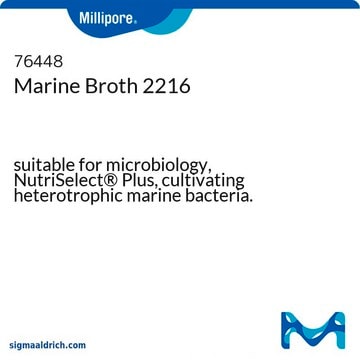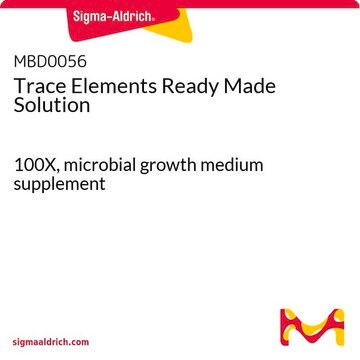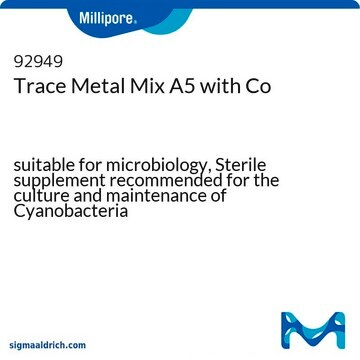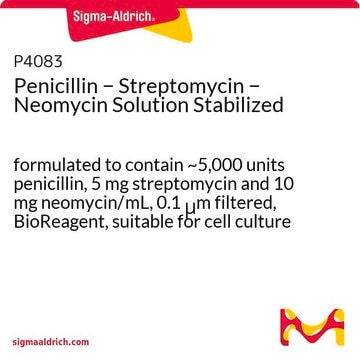G9903
Guillard′s (F/2) Marine Water Enrichment Solution
50 ×, liquid, suitable for plant cell culture
Synonym(s):
F/2 Water Enrichment, Marine Enrichment Solution
Sign Into View Organizational & Contract Pricing
All Photos(1)
About This Item
UNSPSC Code:
12352207
NACRES:
NA.72
Recommended Products
sterility
sterile-filtered
Quality Level
form
liquid
concentration
50 ×
technique(s)
cell culture | plant: suitable
application(s)
agriculture
shipped in
dry ice
storage temp.
−20°C
General description
Guillard′s (F/2) Marine Water Enrichment Solution is composed of major nutrients, trace metals and vitamins. Guillard′s (F/2) Marine Water Enrichment Solution may be used as a chemstock to support the reconstitution of Guillard′s (F/2) Marine Enrichment medium.
Application
Guillard′s (F/2) Marine Enrichment medium is a widely used enriched seawater medium for growing costal marine algae (diatoms).
Formula variant
With the major nutrients, trace metals and vitamins as described by Guillard (1975).
Reconstitution
Storage Class Code
12 - Non Combustible Liquids
WGK
WGK 1
Flash Point(F)
Not applicable
Flash Point(C)
Not applicable
Choose from one of the most recent versions:
Already Own This Product?
Find documentation for the products that you have recently purchased in the Document Library.
Customers Also Viewed
Kazuo Umemura et al.
Micron (Oxford, England : 1993), 77, 41-43 (2015-06-22)
We propose a new technique for quantitative trajectory analysis of gliding phenomenon of Navicula pavillardii (NP) and Seminavis robusta (SR) diatom cells by single cell observation using a glass microchamber in this short technical note. Two-dimensional trajectory analysis of cell
Shingo Shoumura et al.
Journal of microbiological methods, 168, 105804-105804 (2019-12-15)
Diatoms are one of the major photosynthetic planktons. Here, we studied movements of aqueous suspensions of diatoms using a home-made 'tumbled' optical microscope system. The usual inverted optical microscope was reoriented using a homemade microscope stand so that the vertical
Kazuo Umemura et al.
European biophysics journal : EBJ, 44(3), 113-119 (2015-01-31)
In this study, we used a microchamber to observe and analyze the gliding phenomenon of Navicula pavillardii diatom cells at different temperatures. The temperature of the culture medium was varied from 17.0 to 30.0 °C to examine the effect of
K H Baker et al.
Applied and environmental microbiology, 35(4), 791-796 (1978-04-01)
The marine diatom Thallasiosira pseudonanna (3H) and several bacteria associated with it were isolated from batch cultures at the University of Delaware mariculture facility. The interaction between the algae and each of the bacteria was investigated. One of the isolates
Yihua Xiao et al.
Journal of environmental sciences (China), 22(8), 1239-1245 (2010-12-25)
The effects of allochthonous dissolved organic matter (DOM) on the growth and photosynthesis of Phaeodactylum tricornutum were investigated. P. tricornutum incubated in f/2 medium was exposed to DOM additives, which were extracted from the plant and sediment samples of a
Protocols
Phycology media can be prepared from concentrated solutions or from powdered salt mixtures. The concentrated solutions are complete, including vitamins, and should be stored frozen.
Our team of scientists has experience in all areas of research including Life Science, Material Science, Chemical Synthesis, Chromatography, Analytical and many others.
Contact Technical Service










